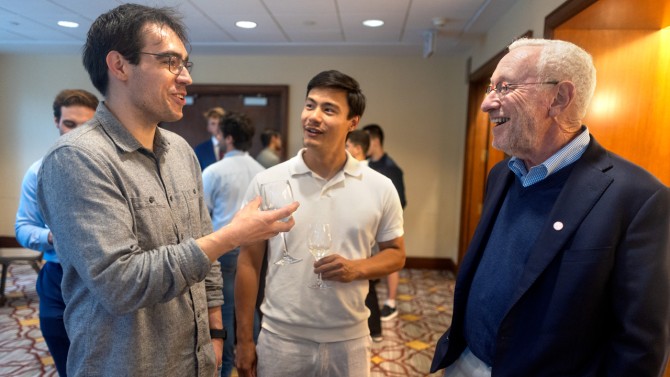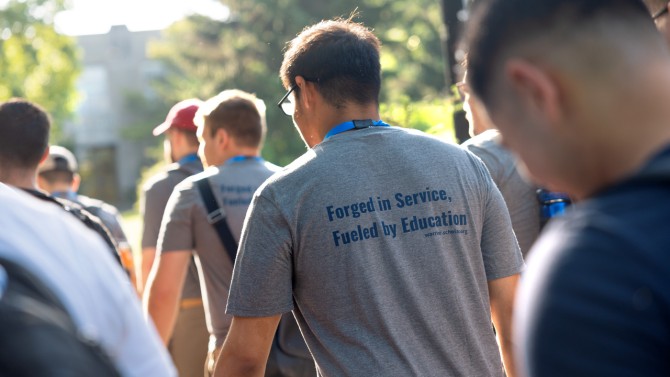
Michael Niemack, professor of physics and astronomy in the College of Arts and Sciences, introduces Warrior-Scholar Project participants to research in the Physical Sciences Building.
Boot camp helps warrior-scholars transition from service to campus
By James Dean, Cornell Chronicle
Do you think of the Declaration of Independence, written nearly 250 years ago, as yours?
In a seminar on “The ideal of American Democracy,” Deborah Dinner, the Dorothea S. Clarke Professor of Law at Cornell Law School, posed that question to a group of active-duty and veteran service members who visited Cornell June 21-28 with the Warrior-Scholar Project (WSP), which helps military personnel and veterans explore and prepare for higher education.
Most had enlisted after high school, when the founding document had seemed abstract and disconnected from their daily lives. But reconsidering it now along with readings from de Tocqueville’s “Democracy in America” and political scientist Danielle Allen’s “Our Declaration,” the text took on new meaning informed by their years of military and life experience.
“The declaration to me was kind of just this relic of the past,” said Cesar Cruz, an Army soldier based at Fort Drum in New York. “Rereading it now with a better understanding, it’s very relevant to me and I can see it for the timeless piece of writing that it is.”
Cruz was one of 19 participants in the nonprofit WSP’s academic boot camp, which Cornell has hosted since 2015. About half the group pursued humanities coursework, with the rest focused on science, technology, engineering and math (STEM). Several said the week of intensive instruction – including seminars led by Cornell faculty, exposure to cutting-edge research facilities and support from WSP staff – had bolstered their interest in pursuing undergraduate or graduate degrees.
“You get to see lectures, tours, facilities and actual applications of what you’re studying,” said Munar, a Navy veteran and aerospace industry systems administrator interested in studying engineering. “Warrior-Scholar makes it seem accessible, and that makes you want to study even more.”
Munar was part of the STEM cohort that donned cleanroom suits and goggles to tour the Cornell NanoScale Science and Technology Facility, where a mote of dust could endanger research projects testing materials smaller than the diameter of a human hair. The protective garb reminded Munar of his training as a Navy corpsman, when he’d suited up in medical scrubs at a Los Angeles trauma center. Here, he appreciated the opportunity to see the “fascinating” nanoscale facility, which prompted reflection about the technology’s potential benefits and threats, if misused, similar to artificial intelligence.
Nicholas Bonasera, who left the Marines last year after a career that included work for the State Department, said that before enrolling in WSP, as a person of color and an immigrant, he wouldn’t have seen schools like Cornell as an option. He now plans to study international relations, which he experienced directly during military service that included supporting an evacuation of the U.S. embassy in Sudan.
“I want to be in a space that cultivates innovative learning, where we can transform into not just being a service member or leader in the military, but leaders in the civilian world,” Bonasera said. “WSP gives you the building blocks and confidence to get back in the classroom.”
In a session providing college admissions guidance and tips, Kyle Downey, a former Army reservist who leads Cornell’s undergraduate admissions for veteran and Reserve Officers’ Training Corps (ROTC) students, told the warrior-scholars not to assume that they couldn’t afford higher education, after factoring in GI Bill benefits and financial aid, and not to underestimate themselves. Most veterans, he said, bring three valuable traits to campuses: maturity, work ethic and grit.
“The general mindset and ability to overcome obstacles, to adapt to situations, to work until you don’t think you can possibly work anymore, to push yourself beyond limits – those are things that are going to serve you well in life, and also serve you well in these application processes and succeeding in college,” Downey said.
Downey highlighted resources Cornell has established to support student veterans, in addition to his own role in admissions: a residential house and campus lounge for veterans; student veteran outreach peer counselors; the Veterans Summer Bridge Program, led by the undergraduate student veteran program director; career services support and advisers in each college or school; and the Cornell Undergraduate Veterans Association.
“We’re going to have all these additional layers of support to make sure that you succeed and make sure you have every opportunity that’s available to you,” Downey said.
Rome Campbell, an active-duty member of the Pennsylvania Army National Guard, said WSP at Cornell provided a valuable refresher on classroom skills he’d had to put on hold during the pandemic, and as importantly, inspiration from like-minded service members committed to bettering themselves.
“That’s something that’s really motivating me,” Campbell said. “I’ve gotten a lot of connections and references to resources that I will take for myself, but will also share with those in my unit who are looking to pursue higher education.”
Media Contact
Get Cornell news delivered right to your inbox.
Subscribe


